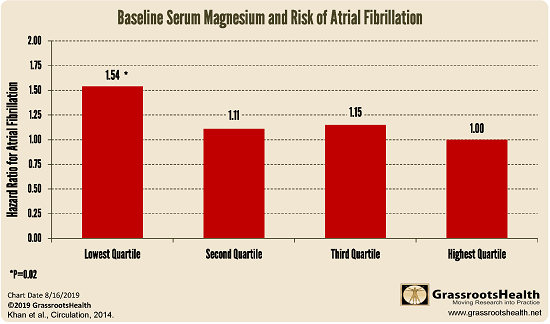Magnesium Shown to Prevent and Correct Atrial Fibrillation
Magnesium Shown to Prevent and Correct Atrial Fibrillation
Greetings!
 |
Atrial fibrillation (also called Afib or AF), is an irregular, often rapid heart rate that can cause symptoms such as heart palpitations, shortness of breath, and weakness. It affects an estimated 2.7 million Americans or more, and can lead to serious complications such as blood clots, stroke, heart failure, and other cardiovascular diseases, which may be fatal. Since some people have no apparent symptoms, it often goes un-diagnosed.
How Could Magnesium Affect Heart Rate?
Magnesium plays several functional roles within cardiac muscle to regulate heart rate and contractions. It helps control the sodium-potassium pump within the cell membranes that causes the muscles of the heart to pump. It has been shown to extend the refractory period of the heart muscle, which is the relaxation time after the heart muscle pumps. In some studies, it has even been more effective at restoring the heart’s rhythm than standard pharmaceutical treatments.
Magnesium and Atrial Fibrillation
Several studies have linked magnesium to the incidence and development of AF. An analysis by Khan et al. used data from the Framingham Offspring Study, which involved more than two decades of data from a total of 3,530 participants, to look at the link between serum magnesium and the development of AF in those without existing cardiovascular disease. Over the time of the analysis, 5% of participants developed AF. The incidence of AF was highest in the quartile with the lowest magnesium level (P=0.02); no additional improvement was shown as serum magnesium rose beyond the level of the second quartile, suggesting there is a threshold serum magnesium level at which no further effect on AF can be seen.
The measurement for magnesium used in this study was the serum magnesium level, which is different than the RBC magnesium measurement in the Elements Panel, offered by GrassrootsHealth. Also note that the RBC magnesium test is a more accurate measurement of magnesium status than serum magnesium.









